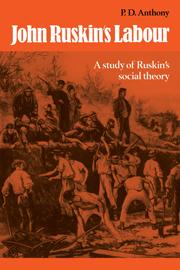4 - Economics, ‘the damned lie’
Published online by Cambridge University Press: 07 October 2011
Summary
For my own part, I feel the force of mechanism and the fury of avaricious commerce to be at present so irresistible that I have seceded from the study not only of architecture, but nearly of all art; and have given myself, as I would in a besieged city, to seek the best modes of getting bread and water for its multitudes, there remaining no question, it seems to me, of other than such grave business for the time.
Thus, by 1865, Ruskin announced his engagement to a labour which had begun in lectures given in Manchester in 1857 (later published as A Joy for Ever), continued with Unto this Last (1862), Munera Pulveris (1862), Time and Tide (1867), and was to be a constant burden for the rest of his active life. He is said to have chosen the medium of lectures to deliver his first radical assaults in order to find some independence and protection from the critical attention of his father. When the first of the essays, to be known later as Unto this Last, was published by the new Cornhill Magazine in 1860, Ruskin's father confessed that he wished John would cease to meddle with political economy or ‘they will mistake him for a Socialist – or Louis Blanc or Mr. Owen of Lanark’. The essays, as the elder Ruskin feared, provoked a great deal of abuse which was not diminished by the author's disclaiming the necessity of any acquaintanceship with economics as a preliminary to his attacks upon it. Thackeray, the editor of the new journal, and Smith, its publisher, were also subjected to hostile criticism so that, after three issues, the essays were discontinued.
- Type
- Chapter
- Information
- John Ruskin's LabourA Study of Ruskin's Social Theory, pp. 72 - 95Publisher: Cambridge University PressPrint publication year: 1984



